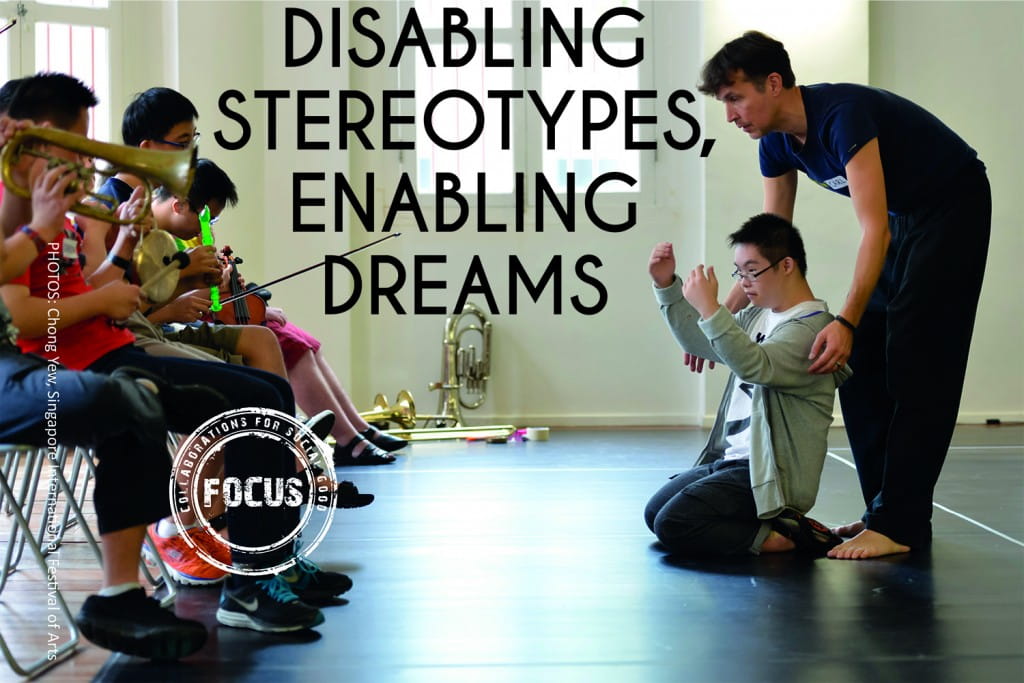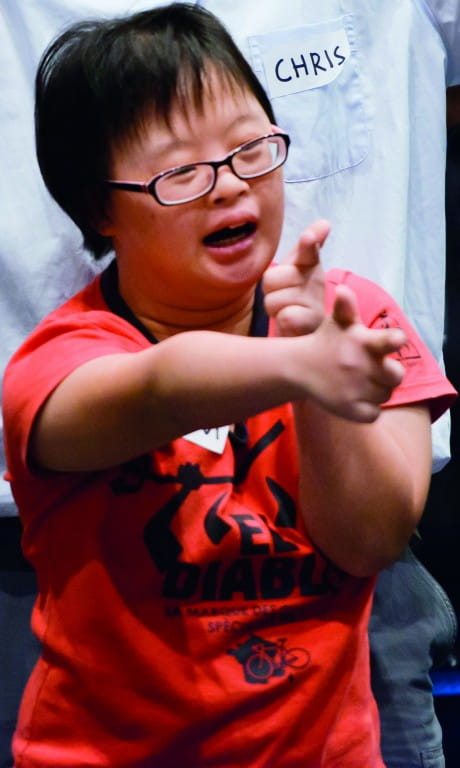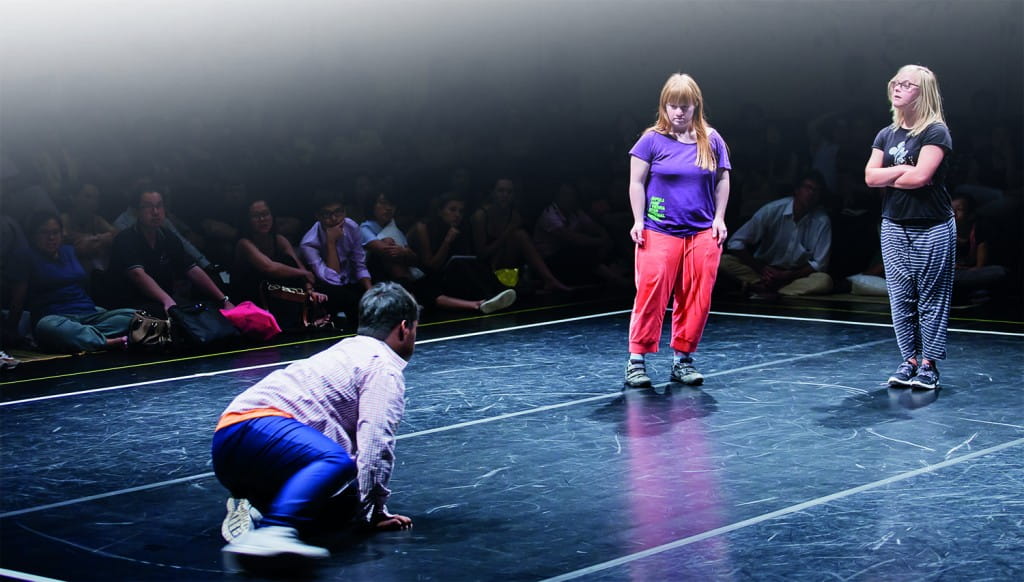
A collaboration between the Singapore International Festival of Arts and a Swiss theatre company enabled special needs youth to fulfill their dream of becoming professional artists through a series of tailored workshops for the intellectually disabled.
Voluntary welfare organisations in Singapore recently collaborated with a Swiss theatre company to showcase the artistic talents of local youths with intellectual difficulties, which culminated in a passionate performance that inspired all involved and turned dreams into reality.
By Tan Keng Yao with additional reporting by Goh Beng Choo
erformers Reuben Khanal and his fellow actors are thespians without a script. At their performance, improvisation rules. They react to impromptu cues from one another, modifying their acts in response to their fellow performers. They take on character after character, segueing seamlessly from playing the king, the queen and the court jester in one scene to acting as musicians the next. They move across the stage in an unrestrained fashion, enjoying the freedom of the full expressions of their bodies, their actions sometimes out of sync to the beat of the music in the background. This is theatre that is raw, uncut and animated, yet powerful.
Khanal, 15, is from the Down Syndrome Association (DSA) while his fellow performers are from the Association for Persons with Special Needs (APSN), Centre for Adults and the Y-Stars, a group of teenagers and young adults with Down syndrome.
They all share a common passion for visual and performing arts, and made their debut at Festival Heart: Into The Wild, an inaugural production featuring special needs individuals, organised by the Singapore International Festival of Arts (SIFA) in September 2014.
The performance was a collaboration between Singapore’s SIFA and Theater HORA, a Swiss theatre company that promotes the artistic development of people with intellectual and learning difficulties, and which also helps them fulfil their dreams of becoming professional arts performers. Theater HORA was conceived and founded by theatre pedagogue Michael Elber and his colleague Chris Weinheimer, in 1993.
WORKSHOPS FOR THE INTELLECTUALLY DISABLED
Into The Wild was the culmination of a series of 15 drama and improvisation workshops jointly organised by Theater HORA and SIFA.
The instructors from Theater HORA were invited by SIFA to facilitate the workshops in Singapore. Speech and drama instructors and accomplished actors Jean Ng and Julius Foo facilitated and also led the workshops, helped by Lee Siew Cheng, a job coach and Theresa Anthony, an instructor from APSN Centre for Adults.
Theater HORA’s recognised theatrical training programme has enabled special-needs individuals to perform in public. During the sessions, participants took part in a series of activities such as improvisation, designed to help them exercise their own choices and creativity. One activity involved the use of musical instruments such as trumpets, trombones, violins, ukuleles and triangles which Theater HORA’s instructors brought along. Each participant, including the coaches, chose a musical instrument to play and improvised a role to go with the instrument. They then took turns to lead other group members in the same action.
Another activity sought to help the actors improve their interaction skills — the leader came up with a scenario, then invited one to two participants to start a conversation. Participants made up lines as they went along.
Participants also learnt how to use body language and facial expressions to communicate with one another by miming their responses to a piece of music and slowly building a story together.
Said Satya Venugopal, Executive (Services & Membership) from DSA,
who had observed the workshops: “It was good that the workshops taught non-verbal communication. Communication is a life skill, and many persons with Down syndrome have physical challenges which limit their verbal communication. Some are pre-verbal well into adulthood, so this is very helpful to them.
He noted another positive outcome: “Participants who were typically very shy became more outgoing by the end of the workshops. They were more eager in interacting with their peers, and more confident in projecting themselves.”
The workshops’ focus on improvisation also drew out the youths’ sense of humour. They would, for example, act out funny situations when ad-libbing, and sometimes use comic timing and facial expressions to turn an otherwise serious scenario into a funny one.
Satya said that the activities allowed the participants to be in control of their own choices, which was particularly empowering because, in their day-to-day living, they are usually told what to do, and have decisions made for them.
 Special needs youth with artistic talent made their acting debut at two public performances as part of the Singapore International Festival of Arts held in September 2014.
Special needs youth with artistic talent made their acting debut at two public performances as part of the Singapore International Festival of Arts held in September 2014.
“Participants who were typically very shy became more outgoing by the end of the workshops. They were more eager in interacting with their peers, and more confident in projecting themselves.”
— Satya Venugopal, Executive, Down Syndrome Association
“The workshops were excellent. It offered them an opportunity to be respected as adults capable of making their own decisions. And, in turn, they learnt to respect their fellow participants and their choices,” explained Satya. “I am also glad that workshop participants were taught turn-taking and the discipline of following a broad set of rules.”
CROSS-CULTURAL FRIENDSHIPS
This experience marked a new chapter for Khanal, who said he was “happy with the workshops” as he was given the opportunity to play the trumpet. The cheerful teenager, who aspires to be a performing artist, is also a drummer in the DSA’s Drum Prodigy Ensemble and Fusion Dance Group, which are interest groups that meet weekly for lessons and practice sessions.
Like Khanal, many of the other participants found the workshops enjoyable, and were eager to take part in other sessions like these. Despite the fact that Theater HORA’s artists spoke only Swiss-German while the Singaporeans spoke English — instructions were given bilingually — language barriers broke down quickly through a common love
for acting.
By the end of two weeks, friendships had been forged between the participants from Singapore and Theater HORA.
Theater HORA’s Artistic Director Elber said his involvement in this project gave him great satisfaction. “What we did was great work. Without drill. Without stress. Without pressure. But with a lot of hard work, concentration and fun.”
He added: “Everybody took his or her own responsibility and worked together for the common goal. This is certainly one of the most important experiences in theatre.”
He also expressed deep gratitude to his Singapore partners: “The leaders of the different groups made time for daily discussions, gave us a lot of basic information and supported us, showing appreciation for our ‘strange’ theatre work.”
“I saw them in a different light compared to when I see them at our Centre. This experience has brought me closer to them and allowed me to have a better understanding of who they are as individuals.”
— Lee Siew Cheng, Job Coach at APSN Centre for Adults
FRUITFUL EXPERIENCE
Satya noted that the workshop had been a fruitful experience for the participants.
“They were sociable and interacted well with their peers. This was very exciting for me, and even more so for many of the participants’ parents and the DSA speech and drama coaches.”
DSA hopes this is just the beginning. “We’re excited to see where we can take things from here, and would love for our members to come into their own as performers,” said Satya.
“We hope that ultimately, people will look at them as artists and not merely as persons with disabilities.”
APSN’s job coach Lee also found it delightful to see another aspect to the participants’ characters.
“These workshops showed the youths that there is no right or wrong in acting and performing. It gave them the space and freedom to express their own thoughts in a given situation.
“I saw them in a different light compared to when I see them at our centre. This experience has brought me closer to them and allowed me to have a better understanding of who they are as individuals.”
She also found it heartening to see the faces of the family members light up as they watched Festival Heart: Into The Wild.
“They were filled with joy to see their children performing on stage.”

Special needs actors learn how to communicate with one another through a theatrical technique called improvisation, where one actor responds to another actor’s actions, to gradually build up a story.
